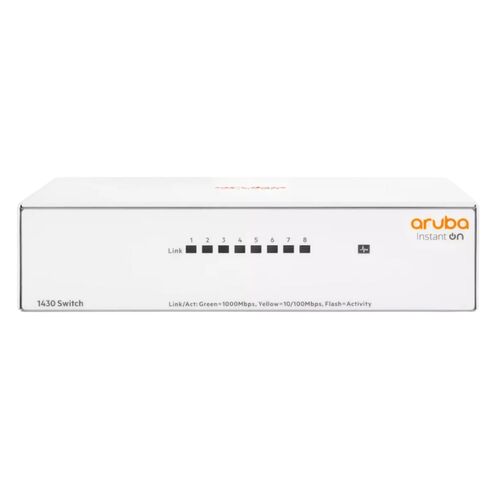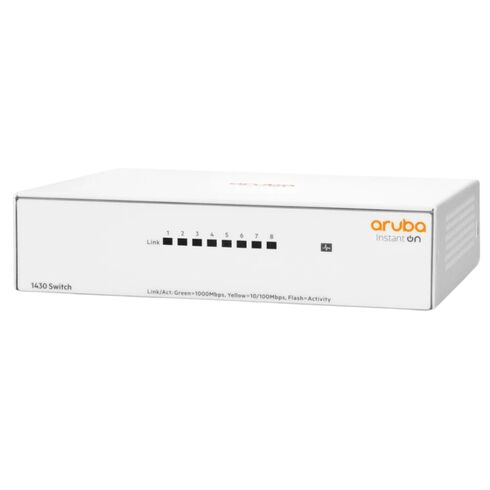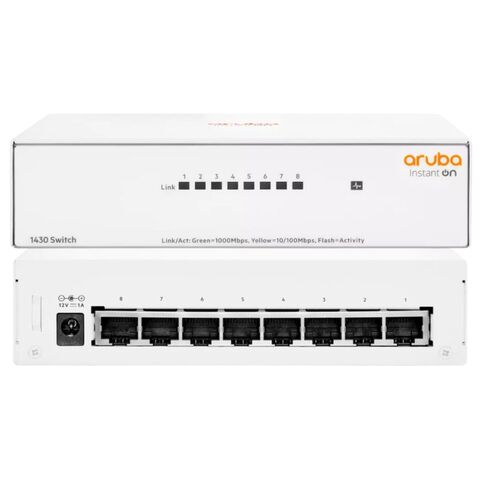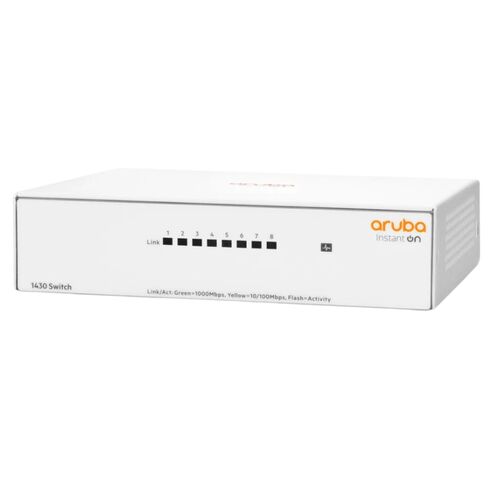R8R46A#ABA HPE Aruba Instant On 1430 8G PoE Switch
- — Free Ground Shipping
- — Min. 6-month Replacement Warranty
- — Genuine/Authentic Products
- — Easy Return and Exchange
- — Different Payment Methods
- — Best Price
- — We Guarantee Price Matching
- — Tax-Exempt Facilities
- — 24/7 Live Chat, Phone Support
- — Visa, MasterCard, Discover, and Amex
- — JCB, Diners Club, UnionPay
- — PayPal, ACH/Bank Transfer (11% Off)
- — Apple Pay, Amazon Pay, Google Pay
- — Buy Now, Pay Later - Affirm, Afterpay
- — GOV/EDU/Institutions PO's Accepted
- — Invoices
- — Deliver Anywhere
- — Express Delivery in the USA and Worldwide
- — Ship to -APO -FPO
- — For USA - Free Ground Shipping
- — Worldwide - from $30
Overview of HPE R8R46A#ABA Aruba Instant 8G PoE Switch
Device Specifications
- Brand: HPE
- Part Number: R8R46A#ABA
- Model Name: Aruba Instant On 1430 8G
- Ethernet Technology: 10/100/1000Base-T
Key Features of the HPE R8R46A#ABA Ethernet Switch
- Device Type: Ethernet Switch
- Model: Aruba Instant On 1430 8G
- Port Count: 8 Gigabit Ethernet Ports with PoE capability
- Network Speed: 10/100/1000Base-T
- PoE Power Budget: 64W Power over Ethernet (PoE) Budget
- Power Consumption: 90W
- Mounting: Rack-mountable for easy installation
Networking Capabilities and Performance
Gigabit Ethernet Ports with PoE Support
- Supports 8 Gigabit Ethernet ports for high-speed data transfer
- Power over Ethernet (PoE) functionality to streamline device connectivity
- Each port offers flexibility for various network devices, ensuring reliable performance
10/100/1000Base-T Connectivity
- Supports advanced 10/100/1000Base-T network technology for versatile networking
- Ideal for connecting a wide array of devices, from computers to security cameras
- Enables seamless operation and future-proof performance in modern network infrastructures
Power and Energy Efficiency
PoE Power Budget and Consumption
- 64W PoE power budget ensures ample energy for powered devices like IP phones or cameras
- Efficient power consumption of 90W allows for cost-effective, energy-efficient operation
- Minimizes the need for additional power adapters, simplifying setup and reducing clutter
Model Specifications at a Glance
Additional Features
- Rack-mountable design for easy installation in server rooms or data centers
- Supports Layer 2 networking protocols for optimal performance and flexibility
- Reliable power management with support for PoE (Power over Ethernet) to power connected devices
Class Feature: Class4 PoE
Class4 Power over Ethernet (PoE) is a standard that allows for the transfer of electrical power along with data over Ethernet cables. It provides a convenient and efficient way to power devices such as IP phones, wireless access points, and security cameras without the need for separate power cables.
The Benefits of Class4 PoE
1. Simplified Installation
With Class4 PoE, you can easily install and connect your devices without the hassle of running additional power cables. This not only saves time but also reduces clutter and eliminates the need for multiple power sources.
2. Flexibility and Scalability
Class4 PoE offers flexibility and scalability as it allows you to add or relocate devices without the need for extensive rewiring. This makes it an ideal solution for businesses that may need to reconfigure their network infrastructure frequently or expand their operations.
3. Cost-Effective Solution
By utilizing Class4 PoE, you can significantly reduce the overall costs associated with powering your network devices. The elimination of separate power cables means fewer materials to purchase and less labor required for installation, resulting in cost savings.
4. Enhanced Reliability
With Class4 PoE, your network devices receive a stable and reliable power supply, ensuring uninterrupted operation even during power outages. This is especially crucial for critical applications such as security systems or emergency services where downtime is not an option.
Importance of Class4 PoE in Various Industries
Class4 PoE has gained immense importance across various industries due to its numerous benefits. Let's explore some sectors where this feature plays a vital role:
1. Security and Surveillance
Class4 PoE is widely used in security and surveillance systems as it simplifies the installation process and provides a reliable power source for IP cameras, video recorders, and access control devices. It allows for easy placement of cameras in areas that may not have easy access to power outlets.
2. Healthcare
In healthcare facilities, Class4 PoE enables the seamless integration of medical devices and enhances patient care. It powers medical equipment such as bedside monitors, infusion pumps, and telemedicine devices, ensuring continuous operation and reducing the risk of power-related disruptions.
3. Retail
Retail businesses benefit from Class4 PoE by powering point-of-sale systems, barcode scanners, and digital signage displays. It simplifies store layout changes and enables the use of wireless access points for efficient customer connectivity throughout the premises.
4. Education
Class4 PoE is highly advantageous in educational institutions where it powers IP phones, Wi-Fi access points, and classroom audiovisual equipment. It facilitates quick and easy setup of network devices in classrooms, libraries, and administrative areas.
Manufacturer Feature: HPE
About HPE
Hewlett Packard Enterprise (HPE) is a leading global technology company that provides innovative solutions to empower organizations. With a rich history of over 80 years, HPE is known for its expertise in developing cutting-edge networking products that deliver exceptional performance and reliability.
The Benefits of Choosing HPE
1. Trusted Reputation
HPE has built a strong reputation for delivering high-quality products and services to customers worldwide. Their commitment to innovation and customer satisfaction has made them a trusted choice across industries.
2. Extensive Product Portfolio
As a global technology leader, HPE offers a comprehensive range of networking solutions to meet the diverse needs of businesses. From switches and routers to wireless access points and network management software, HPE provides a complete ecosystem for building robust and scalable networks.
3. Reliability and Performance
HPE networking products are known for their exceptional reliability and performance. Their switches, including the Aruba 1430 8G Ethernet Switch, are designed to deliver high-speed connectivity, low latency, and advanced features to support demanding applications and ensure seamless network operation.
4. Simplified Network Management
HPE's network management software, such as Aruba Central, offers centralized visibility and control over the entire network infrastructure. It simplifies network administration tasks, improves troubleshooting capabilities, and enhances overall network performance.
Importance of HPE in Different Industries
HPE's networking solutions have a significant impact on various industries, enabling them to achieve their goals efficiently. Let's explore some sectors where HPE's products are of utmost importance:
1. Enterprise
In the enterprise sector, HPE's networking solutions play a crucial role in building scalable and secure networks that support the digital transformation initiatives of organizations. Whether it's facilitating cloud connectivity or enabling IoT deployments, HPE provides the necessary tools to drive innovation.
2. Healthcare
In healthcare, HPE's networking solutions help improve patient care by providing reliable connectivity for medical devices, electronic health records, and telemedicine applications. HPE's products ensure secure data transfer and enable healthcare providers to deliver efficient and personalized services.
3. Education
Educational institutions rely on HPE's networking solutions to create a connected learning environment. From campus-wide Wi-Fi coverage to secure access control systems, HPE's products enhance collaboration, enable e-learning, and support administrative operations in schools and universities.
4. Retail
HPE's networking solutions are essential for retailers in delivering an exceptional customer experience. From enabling reliable point-of-sale systems to facilitating personalized marketing campaigns, HPE's products help retailers optimize operations and drive customer loyalty.
Part Number Feature: R8R46A#ABA
Understanding the Part Number
The part number, R8R46A#ABA, is a unique identifier assigned to the Aruba 1430 8G Ethernet Switch. It helps differentiate this specific model from other similar products in the Aruba networking lineup.
The Benefits of Identifying the Part Number
1. Accurate Product Identification
By referencing the part number, users can accurately identify and ensure they are purchasing the correct model of the Aruba 1430 8G Ethernet Switch. This eliminates any confusion or potential compatibility issues that may arise from selecting the wrong product.
2. Efficient Order Placement
The part number simplifies the order placement process as it provides a standardized reference that can be easily communicated to suppliers or resellers. It ensures that customers receive the exact product they require without any errors or delays.
3. Warranty and Support Registration
Having the part number readily available is essential for registering the product's warranty and accessing technical support from the manufacturer. It streamlines the process and ensures that users can easily access assistance if they encounter any issues or require assistance with their Aruba 1430 8G Ethernet Switch.
Importance of Part Numbers in Networking Equipment
Part numbers play a vital role in the networking equipment industry, ensuring smooth operations and customer satisfaction. Here are some reasons why part numbers are important:
1. Product Differentiation
Part numbers help differentiate various models and versions of networking equipment. This allows users to select the specific product that meets their requirements, ensuring compatibility with their existing network infrastructure.
2. Service and Maintenance
Part numbers assist in the efficient management of service and maintenance activities. Service technicians can easily identify the correct replacement parts or modules required for repairs or upgrades, minimizing downtime and optimizing network performance.
3. Inventory Management
Part numbers enable accurate inventory management for suppliers and resellers. By tracking the availability and demand of specific products, businesses can ensure efficient stock replenishment, reduce excess inventory, and optimize their supply chain operations.
4. Product Lifecycle Management
Part numbers are crucial for tracking the lifecycle of networking equipment. Manufacturers use part numbers to manage software updates, firmware releases, and product enhancements, ensuring customers have access to the latest features and security patches.
Layer Feature: L2
Understanding Layer 2 Networking
Layer 2 (L2) refers to the second layer in the OSI model, responsible for data link functions. It primarily deals with MAC addresses, Ethernet frames, and local area network (LAN) connectivity.
The Benefits of Layer 2 Networking
1. Efficient Local Network Communication
Layer 2 networking enables efficient communication between devices within a local network. It uses MAC addresses to identify devices, allowing for direct communication without the need for routing through multiple networks.
2. Broadcast Domain Segmentation
By dividing a network into multiple Layer 2 broadcast domains using techniques such as VLANs (Virtual Local Area Networks), administrators can improve network performance and security. Broadcast traffic is confined within each VLAN, reducing congestion and enhancing overall network efficiency.
3. MAC Address Learning and Forwarding
Layer 2 switches employ MAC address learning and forwarding techniques to optimize data transfer. Switches learn the MAC addresses of connected devices and use this information to forward data only to the appropriate destination, reducing network congestion.
4. VLAN Support for Network Segmentation
Layer 2 switches support the creation of VLANs, allowing network administrators to segment the network into virtual LANs based on criteria such as department, function, or security requirements. VLANs enhance network security by isolating traffic between different segments and controlling access to resources.
Importance of Layer 2 in Network Infrastructure
Layer 2 plays a critical role in network infrastructure across various industries. Let's explore its importance in different contexts:
1. Campus Networks
Layer 2 networking is essential for campus networks, enabling efficient communication between devices within a university or corporate campus. It simplifies network management and allows for the seamless integration of various services and applications.
2. Data Centers
In data centers, Layer 2 networking facilitates the creation of resilient and flexible network architectures. It supports technologies such as Ethernet Virtual Private Networks (EVPNs) and Virtual Extensible LANs (VXLANs), enabling efficient workload mobility and scalable network virtualization.
3. Industrial Automation
Layer 2 networking is widely used in industrial automation systems to connect devices within a manufacturing environment. It provides reliable and deterministic communication, ensuring real-time control and monitoring of critical processes.
4. Service Provider Networks
Service providers rely on Layer 2 networking to deliver connectivity services to their customers. It enables the creation of Virtual Private LAN Services (VPLS) and Ethernet over MPLS (EoMPLS) solutions, allowing for seamless integration of customer networks into the provider's infrastructure.
Number Of Ports Feature: 8
The Importance of the Number of Ports
The number of ports is a crucial consideration when choosing a network switch, as it determines the capacity to connect devices within a network. The Aruba 1430 8G Ethernet Switch offers 8 ports, providing ample connectivity options for small to medium-sized networks.
The Benefits of Having 8 Ports
1. Increased Device Connectivity
With 8 ports, the Aruba 1430 8G Ethernet Switch allows you to connect multiple devices to your network simultaneously. This is particularly useful in environments where numerous devices such as computers, printers, and VoIP phones need to be connected.
2. Scalability and Future-Proofing
Having 8 ports provides room for future expansion and scalability. It allows you to add more devices or accommodate network growth without the need for additional switches or complex network reconfiguration.
3. Flexibility in Network Design
The availability of 8 ports offers flexibility in designing your network topology. You can create separate VLANs or connect devices from different departments or areas of your organization to specific ports, ensuring efficient traffic management and security.
4. Reducing the Need for Additional Hardware
Having an 8-port switch eliminates the need for additional hardware such as switches or hubs, reducing costs and simplifying network management. It provides a centralized location for connecting devices, reducing cable clutter and potential points of failure.
Importance of Port Count in Different Environments
The number of ports is essential in various environments with diverse networking needs. Let's explore the importance of port count in different contexts:
1. Small Office/Home Office (SOHO)
In SOHO environments, an 8-port switch is ideal as it provides sufficient connectivity options for essential devices such as computers, printers, and network-attached storage devices. It allows individuals or small teams to create a reliable and efficient network infrastructure.
2. Small and Medium-Sized Businesses (SMBs)
SMBs can benefit from an 8-port switch as it offers the necessary capacity to connect multiple devices within the organization. It allows for future expansion and provides the flexibility to accommodate new devices or departments without significant network reconfiguration.
3. Hospitality and Retail
In hospitality and retail settings, an 8-port switch enables connectivity for essential devices such as point-of-sale systems, security cameras, and wireless access points. It provides the necessary capacity to support guest or customer networks while maintaining a secure and efficient network operation.
4. Remote Offices
For remote offices or branch locations, an 8-port switch offers the right balance between connectivity and simplicity. It allows for seamless integration into the main network infrastructure while providing sufficient ports for local devices such as computers, printers, and IP phones.













